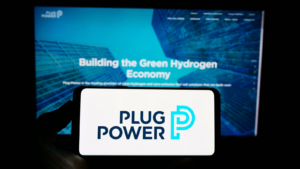However, now that we are in the second half of 2023, some equity investors have become impatient with the deteriorating near-term earnings potential of some hydrogen companies. The Global X Hydrogen ETF (NASDAQ:HYDR), for example, has fallen 42.4% year-to-date.
Despite this, with hydrogen stocks reaching new lows and while energy prices are likely to continue upward due to broader geopolitical events, it may be a good time to consider what hydrogen stocks to buy. Below are three of my suggestions.
Ballard Power Systems (BLDP)

For those already familiar with the hydrogen stock space, Ballard Power Systems (NASDAQ:BLDP) has to already be on their buying list. For those unfamiliar, Ballard is a pioneer in the hydrogen fuel cell industry. The company primarily develops proton exchange membrane (PEM) fuel cell products and has been for more than 30 years. These fuel cells help generate reliable electricity for various applications, such as buses, trucks, trains, ships, and backup power systems.
Ballard Power Systems has been gaining traction in the global market, as more countries and companies are adopting hydrogen as a green alternative to fossil fuels. That does not mean there have not been any macro hurdles to overcome.
The fuel cell company has been impacted by slumping demand in certain international markets, particularly in Europe and China, where hydrogen fuel cell demand has fallen due to slumping economic growth in both regions. These short-term headwinds are likely to diminish as the global economy picks up steam and hydrogen demand recovers. Solaris Bus & Coach, a Polish manufacturer of public transportation vehicles, recently ordered 177 hydrogen fuel cells from Ballard, suggesting there is still demand for their product.
Potential investors should get excited for what is to come.
Bloom Energy (BE)

Bloom Energy (NYSE:BE) is another pure-play innovator in the hydrogen industry. The company specializes in solid oxide fuel cell (SOFC) technology, which can generate electricity from various fuels, including natural gas, biogas, and hydrogen. The “Bloom Energy Server,” in essence, produces electricity through an electrochemical process.
This reduces the need for combustion and thereby reduces emissions. Bloom’s Energy Server can provide reliable, 24/7 power, making them an attractive option for businesses and institutions that require constant power supply. The server also operates independently of the grid. This can be a crucial advantage during power outages or in areas with unstable grid infrastructure.
Bloom Energy had been impressing investors in the last few years with its financial performance and product innovation. In 2022, the company posted a record revenue of $1.2 billion, up 23% year-over-year, and a gross margin of 21%. In July, Bloom Energy announced the groundbreaking launch of Series 10, 10MW fuel cell offering.
While shares have fallen 40.8% year-to-date, Wall Street analysts are still projecting a 102.1% upside, which could put potential investors in a good spot if they invest now.
Plug Power (PLUG)

Plug Power (NASDAQ: PLUG) is the largest supplier of liquid hydrogen, and the company produces hydrogen fuel cells for mobility applications. In particular, Plug Power’s hydrogen fuel cells mainly service supply chain and logistics industries, providing hydrogen-powered forklifts, trucks, buses and drones.
As fuel costs move upward, alternative energy sources, especially for powering industrial vehicles, can save immense costs and reduce greenhouse gas emissions in the long run. The hydrogen fuel cell developer has successfully formed several strategic partnerships with major players in the mobility and logistics sector. This includes Amazon (NASDAQ:AMZN), Walmart (NYSE:WMT), and Airbus (OTCPK:EADSY).
Plug Power’s shares are down 50.6%, despite beating revenue estimates consecutively in 2023. Investors have definitely grown impatient. While shares trade around 2.1 times forward revenue, investors interested in investing in the burgeoning hydrogen market should take notice.
On the date of publication, Tyrik Torres did not have (either directly or indirectly) any positions in the securities mentioned in this article. The opinions expressed in this article are those of the writer, subject to the InvestorPlace.com Publishing Guidelines.
